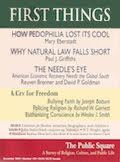 I have a long piece out in this month’s First Things on the conscience clause issue. I believe that the Culture of Death brooks no dissent and we are witnessing the beginning of requirements for health care professionals to either participate in medical procedures that end human life—or be complicit in them by requiring them to refer—the current abortion law in Victoria, Australia. The piece is too long to present fully here, but here are a few exerpts
I have a long piece out in this month’s First Things on the conscience clause issue. I believe that the Culture of Death brooks no dissent and we are witnessing the beginning of requirements for health care professionals to either participate in medical procedures that end human life—or be complicit in them by requiring them to refer—the current abortion law in Victoria, Australia. The piece is too long to present fully here, but here are a few exerpts
First, I set up the problem. From the article:
Over the past fifty years, the purposes and practices of medicine have changed radically. Where medical ethics was once life-affirming, today’s treatments and medical procedures increasingly involve the legal taking of human life. The litany is familiar: More than one million pregnancies are extinguished each year in the United States, thousands late-term. Physician-assisted suicide is legal in Oregon, Washington, and, as this is written, Montana via a court ruling (currently on appeal to the state supreme court). One day, doctors may be authorized to kill patients with active euthanasia, as they do already in the Netherlands, Belgium, and Luxembourg.
The trend toward accepting the termination of some human lives as a normal part of medicine is accelerating. For example, ten or twenty years from now, the physician’s tools may include embryonic stem cells or products obtained from cloned embryos and fetuses gestated for that purpose, making physicians who provide such treatments complicit in the life destruction required to obtain the modalities. Medical and bioethics journals energetically advocate a redefinition of death to include a diagnosis of persistent vegetative state so that these living patients—redefined as dead—may be used for organ harvesting and medical experimentation. More radical bioethicists and mental-health professionals even suggest that patients suffering from BIID (body-integrity identity disorder), a terrible compulsion to become an amputee, should be treated by having healthy limbs removed, just as transsexuals today receive surgical sexual reassignment.
I acknowledge the comity that currently exists in the USA, where no doctor is forced to perform an abortion or participate in assisted suicide. But the times, they are a’changing. I quote articles, a court decision, medical professional ethics decisions, etc., pointing toward forced participation by health care workers in life-terminating medical procedures. I then turn to what I think conscience clauses should look like:
If Hippocratic medicine is to be salvaged, the rights of medical conscience need to be expanded and made explicit. With the understanding that there may be nuances in specific circumstances not discussed here, I suggest that the following general principles apply in crafting such protections:
- Conscience clauses should be legally binding.
- The rights of conscience should apply to medical facilities such as hospitals and nursing homes as well as to individuals.
- Except in rare and compelling circumstances in which a patient’s life is at stake, no medical professional should be compelled to perform or participate in procedures or treatments that take human life.
- The rights of conscience should apply most strongly in elective procedures, that is, medical treatments not required to extend the life of, or prevent serious harm to, the patient.
- It should be the procedure that is objectionable, not the patient. In this way, for example, physicians could not refuse to treat a lung-cancer patient because the patient smoked or to maintain the life of a patient in a vegetative state because the physician believed that people with profound impairments do not have a life worth living.
- No medical professional should ever be forced to participate in a medical procedure intended primarily to facilitate the patient’s lifestyle preferences or desires (in contrast to maintaining life or treating a disease or injury).
- To avoid conflicts and respect patient autonomy, patients should be advised, whenever feasible, in advance of a professional’s or facility’s conscientious objection to performing or participating in legal medical procedures or treatments.
- The rights of conscience should be limited to bona fide medical facilities such as hospitals, skilled nursing centers, and hospices and to licensed medical professionals such as physicians, nurses, and pharmacists.
Then, I conclude:
It is a sad day when medical professionals and facilities have to be protected legally from coerced participation in life-terminating medical procedures. But there is no denying the direction in which the scientific and moral currents are flowing. With ethical views in society and medicine growing increasingly polyglot, with the sanctity of human life increasingly under a cloud in the medical context, and given the establishment’s marked hostility toward medical professionals who adhere to the traditional Hippocratic maxims, conscience clauses may be the only shelter protecting traditional morality in medicine.
I believe that medical conscience is going to be one of the most intense and bitter bioethical issues of the next ten years. The time to prepare to wage the debate is now.
